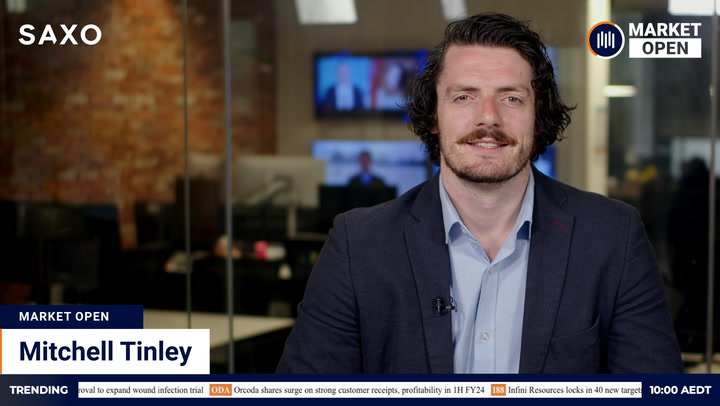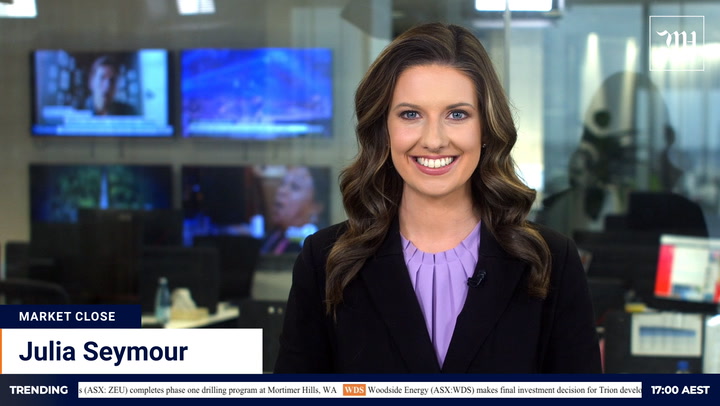A cyclicals-led sell-off on Wall Street points to early pressure on the ASX following three days of slender gains.
ASX futures declined 29 points or 0.39 per cent as US stocks closed mixed but broadly lower. The Dow and S&P 500 declined, while the Nasdaq held on to a slender gain.
Iron ore rebounded from a seven-month low. Precious and industrial metals retreated. Gold suffered its biggest hit in a month as the US dollar and treasury yields jumped. The Australian dollar fell below 74 US cents.
Wall Street
Economically-sensitive stocks dragged the Dow and S&P 500 lower as growth worries flared following the Labor Day long weekend.
The Dow Jones Industrial Average fell 269 points or 0.76 per cent. The S&P 500 shed 15 points or 0.4 per cent. The Nasdaq Composite hit an all-time high before a surge in yields clipped its advance to 11 points or 0.07 per cent.
Several analysts downgraded their outlooks for the economy in the wake of Friday’s disappointing August employment report. Goldman Sachs cut its fourth-quarter GDP expectation to 5.5 per cent from 6.5 per cent, citing the impact of the delta variant. The bank lowered its 2021 GDP target to 5.7 per cent from 6.2 per cent.
“The Delta variant is already weighing on Q3 growth, and fading fiscal stimulus and a slower service-sector recovery will both be headwinds in the medium term,” Goldman economist Ronnie Walker wrote.
Morgan Stanley downgraded US equities to “underweight”.
“We see a bumpy September-October as the final stages of a mid-cycle transition play out,” the firm’s strategists wrote.
David Kelly, chief global strategist for JPMorgan Chase’s asset management division, also sounded a warning: “The delta variant, combined with low vaccination rates, has pushed COVID-19 infections once again to over 150,000 confirmed cases per day, slowing the service sector recovery,” he said.
“Looking forward, not just at next year but out to 2023, it now appears more likely that the economy will glide down to a slow-but-steady expansion.”
Boeing was among the biggest drags on the Dow, falling 1.8 per cent after Ryanair walked away from negotiations to buy several 737 MAX 10 jets. A broker downgrade weighed on drugmakers Merck, Amgen and Johnson & Johnson.
Gains in Amazon, Apple and Facebook helped keep the Nasdaq in positive territory despite a rally in benchmark yields. The yield on ten-year US treasuries surged almost five basis points to an eight-week high.
Australian outlook
The S&P/ASX 200‘s three-day rally faces early pressure. The index has crawled up 45 points or 0.6 per cent since Friday, overcoming sharp initial declines over the last two sessions. Morning slumps, followed by afternoon recoveries have been a notable feature of trade over the last two weeks.
The market appears to have settled into a horizontal trading range. Traders have been willing to buy below 7500, taking profits whenever the index breaks above 7540. Today’s open may offer another opportunity to load up.
Big Tech offered the only haven in the US overnight. Industrials skidded 1.77 per cent, materials 0.65 per cent, energy 0.57 per cent and financials 0.57 per cent. Bond proxies such as utilities, real estate and consumer staples also declined.
Gold stocks followed metal prices lower. The NYSE Arca Gold Bugs Index sagged 2.89 per cent.
RBA Deputy Governor Guy Debelle is due to address an online conference tonight and will take questions. The event may be an opportunity for the bank to expand on the reasoning behind yesterday’s decision to reduce support for the economy during a contraction. The bank announced it would press ahead with previously-announced plans to reduce its weekly purchases of government bonds to $4 billion from $5 billion, but delay any further reduction until February.
Companies going ex-dividend today include Brambles, St Barbara, Blackmores, Seek and Medibank.
The dollar fell 0.66 per cent to 73.87 US cents as the greenback firmed.
Commodities
A surge in yields and a strengthening greenback helped drive gold to its heaviest loss in roughly a month. Gold for December delivery settled US$35.20 or 1.9 per cent lower at US$1,798.50 an ounce.
Iron ore rebounded as Chinese buyers took advantage of the lowest prices in seven months. The spot price for ore landed at Tianjin rallied US$6.35 or 4.8 per cent to US$137.85 a tonne, recouping around half of Monday’s decline.
BHP‘s US-listed stock shed 1.68 per cent and its UK-listed stock 0.31 per cent. Rio Tinto lost 1.73 per cent in the US despite a 0.43 per cent bounce in the UK.
Oil added to Monday’s decline, which followed reports Saudi Arabia reduced crude prices for Asian customers. Brent crude settled 53 US cents or 0.7 per cent weaker at US$71.69 a barrel.
Aluminium surrendered ten-year highs as a stronger US dollar weighed on industrial metals. Benchmark aluminium on the London Metal Exchange eased 0.7 per cent to US$2,738.20 a tonne. Copper dropped 1.2 per cent, nickel 0.8 per cent, lead 0.8 per cent and tin 2.5 per cent. Zinc rose 1.2 per cent.







